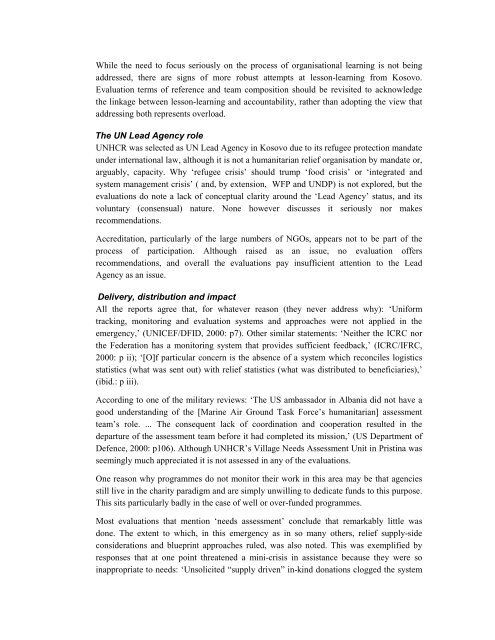Download PDF - ReliefWeb
Download PDF - ReliefWeb
Download PDF - ReliefWeb
Create successful ePaper yourself
Turn your PDF publications into a flip-book with our unique Google optimized e-Paper software.
While the need to focus seriously on the process of organisational learning is not being<br />
addressed, there are signs of more robust attempts at lesson-learning from Kosovo.<br />
Evaluation terms of reference and team composition should be revisited to acknowledge<br />
the linkage between lesson-learning and accountability, rather than adopting the view that<br />
addressing both represents overload.<br />
The UN Lead Agency role<br />
UNHCR was selected as UN Lead Agency in Kosovo due to its refugee protection mandate<br />
under international law, although it is not a humanitarian relief organisation by mandate or,<br />
arguably, capacity. Why ‘refugee crisis’ should trump ‘food crisis’ or ‘integrated and<br />
system management crisis’ ( and, by extension, WFP and UNDP) is not explored, but the<br />
evaluations do note a lack of conceptual clarity around the ‘Lead Agency’ status, and its<br />
voluntary (consensual) nature. None however discusses it seriously nor makes<br />
recommendations.<br />
Accreditation, particularly of the large numbers of NGOs, appears not to be part of the<br />
process of participation. Although raised as an issue, no evaluation offers<br />
recommendations, and overall the evaluations pay insufficient attention to the Lead<br />
Agency as an issue.<br />
Delivery, distribution and impact<br />
All the reports agree that, for whatever reason (they never address why): ‘Uniform<br />
tracking, monitoring and evaluation systems and approaches were not applied in the<br />
emergency,’ (UNICEF/DFID, 2000: p7). Other similar statements: ‘Neither the ICRC nor<br />
the Federation has a monitoring system that provides sufficient feedback,’ (ICRC/IFRC,<br />
2000: p ii); ‘[O]f particular concern is the absence of a system which reconciles logistics<br />
statistics (what was sent out) with relief statistics (what was distributed to beneficiaries),’<br />
(ibid.: p iii).<br />
According to one of the military reviews: ‘The US ambassador in Albania did not have a<br />
good understanding of the [Marine Air Ground Task Force’s humanitarian] assessment<br />
team’s role. ... The consequent lack of coordination and cooperation resulted in the<br />
departure of the assessment team before it had completed its mission,’ (US Department of<br />
Defence, 2000: p106). Although UNHCR’s Village Needs Assessment Unit in Pristina was<br />
seemingly much appreciated it is not assessed in any of the evaluations.<br />
One reason why programmes do not monitor their work in this area may be that agencies<br />
still live in the charity paradigm and are simply unwilling to dedicate funds to this purpose.<br />
This sits particularly badly in the case of well or over-funded programmes.<br />
Most evaluations that mention ‘needs assessment’ conclude that remarkably little was<br />
done. The extent to which, in this emergency as in so many others, relief supply-side<br />
considerations and blueprint approaches ruled, was also noted. This was exemplified by<br />
responses that at one point threatened a mini-crisis in assistance because they were so<br />
inappropriate to needs: ‘Unsolicited “supply driven” in-kind donations clogged the system
















![CynefinFramework final [Read-Only]](https://img.yumpu.com/19017304/1/190x135/cynefinframework-final-read-only.jpg?quality=85)